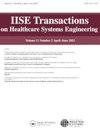Secure decentralized decisions to enhance coordination in consolidated hospital systems
IF 1.5
Q3 HEALTH CARE SCIENCES & SERVICES
IISE Transactions on Healthcare Systems Engineering
Pub Date : 2020-04-02
DOI:10.1080/24725579.2019.1680582
引用次数: 4
Abstract
Abstract Shared decision making has become a crucial solution to build a consolidated healthcare system. While there is some research in the healthcare literature discussing the advantages and disadvantages of shared decision making, its efficiency has not been addressed quantitatively. In this paper, we propose a Decentralized Patients Assignment System (DPAS) as a universal decentralized decision making architecture. It utilizes the blockchain technology, machine learning, and integer programing to enhance coordination among healthcare providers and patients in consolidated hospital systems. To test the efficiency of the proposed DPAS, a prototype system is developed using an Agent-based model and Ethereum and is compared to the current practice of central referral systems in consolidated hospital systems. The agent-based model consists of four agents including patients, physicians, hospitals, and miners interacting within a decentralized system. The proposed system highlights the importance of interoperability and consensus among healthcare agents in the decision making process. The results demonstrate the DPAS efficiency in decreasing computational time and rejection rates for patients transfer.确保权力下放决策,以加强合并医院系统的协调
摘要共享决策已成为建立统一医疗保健系统的关键解决方案。虽然医疗保健文献中有一些研究讨论了共享决策的优点和缺点,但其效率尚未得到定量解决。在本文中,我们提出了一个去中心化患者分配系统(DPAS)作为一个通用的去中心化决策体系结构。它利用区块链技术、机器学习和整数编程来加强综合医院系统中医疗保健提供者和患者之间的协调。为了测试所提出的DPAS的效率,使用基于代理的模型和以太坊开发了一个原型系统,并将其与合并医院系统中的中央转诊系统的当前实践进行了比较。基于代理的模型由四个代理组成,包括在去中心化系统中交互的患者、医生、医院和矿工。所提出的系统强调了医疗机构在决策过程中的互操作性和共识的重要性。结果证明了DPAS在减少患者转移的计算时间和排异率方面的效率。
本文章由计算机程序翻译,如有差异,请以英文原文为准。
求助全文
约1分钟内获得全文
求助全文
来源期刊

IISE Transactions on Healthcare Systems Engineering
Social Sciences-Safety Research
CiteScore
3.10
自引率
0.00%
发文量
19
期刊介绍:
IISE Transactions on Healthcare Systems Engineering aims to foster the healthcare systems community by publishing high quality papers that have a strong methodological focus and direct applicability to healthcare systems. Published quarterly, the journal supports research that explores: · Healthcare Operations Management · Medical Decision Making · Socio-Technical Systems Analysis related to healthcare · Quality Engineering · Healthcare Informatics · Healthcare Policy We are looking forward to accepting submissions that document the development and use of industrial and systems engineering tools and techniques including: · Healthcare operations research · Healthcare statistics · Healthcare information systems · Healthcare work measurement · Human factors/ergonomics applied to healthcare systems Research that explores the integration of these tools and techniques with those from other engineering and medical disciplines are also featured. We encourage the submission of clinical notes, or practice notes, to show the impact of contributions that will be published. We also encourage authors to collect an impact statement from their clinical partners to show the impact of research in the clinical practices.
 求助内容:
求助内容: 应助结果提醒方式:
应助结果提醒方式:


